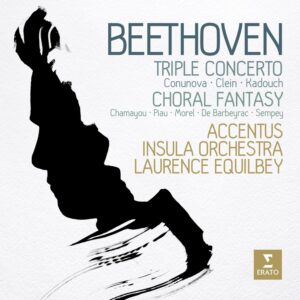I’ve never really enjoyed Beethoven’s Triple Concerto, and listening to this performance I’m pretty sure why. It’s really more a piece of chamber music than a full-grown mid-Beethoven symphonic affair; it has to be lean so that the interplay among the three soloists’ strands and ability to play off one another are clear and their teamwork palpable. This set, on period instruments, is played and led with just that clarity, and it maintains Beethoven’s grand scheme while remaining translucent. The 67-strong Insula Orchestra is anything but flimsy, and Laurence Equilbey’s leadership is filled with forward propulsion in both pieces recorded here.
The Choral Fantasy, coming first on the CD, is unique in Beethoven’s oeuvre (or anyone else’s), spending a few minutes as a piano solo, mostly in a type of questioning fashion, moving around, showing itself off. The piano used here is an 1892 Pleyel, which is less aggressive than today’s instrument and certainly more punchy than one from Beethoven’s era. When the strings—and then woodwinds and horns—enter, they do so in the same vein, with smooth tone and at a gracious clip and volume. The following interplay among varying instruments—sometimes with, often without, piano—is witty and just right, and when all the instruments state their “Ode to Joy”-like theme, it’s noble and rich. The singers enter and the overall good-naturedness is complete. Bertrand Chamayou’s playing is alternately modest and virtuosic, and the overall effect is utterly joyful, the braying horns zipping along with the rest of the crew.
The “Triple” receives an equally classy reading. The opening, both sturdy and opulent, gives way to Natalie Clein’s mellow cello sounds, Alexandra Conunova’s incredibly sweet violin, and pianist David Kadouch’s alternately substantial and politely back-seat playing. The inward-looking Largo opens with a gorgeous cello tune played with true tenderness by Clein, seconded only by Conunova’s long solo, expressively played. The seamless way this movement melts into the jolly if still elegant finale is utterly organic. The Polish dance rhythms of the finale are never foot-stomping; decorum is never broken in Equilbey’s reading. The recording keeps the soloists front-and-center. Refined and suave yet energetic playing by all involved puts this set at the top of the list of recorded “Triples”. I put this up there with Karajan’s performance with Richter, Oistrakh, and Rostropovich, which is far more dramatic, but not necessarily “better”.
































